Beijing, CN weather for 12 august 2008: sunny with blue skies, afternoon chance of scattered clouds, high 30° C – low 22° C.
 above: Are Fuwa dolls allowed to speak on the job? Only if you look them in eyes. “你那里面热不热?“ “还好!“
above: Are Fuwa dolls allowed to speak on the job? Only if you look them in eyes. “你那里面热不热?“ “还好!“
“In the field of telecommunications, a communications protocol is the set of standard rules for data representation, signaling, authentication and error detection required to send information over a communications channel.” (wikipedia)
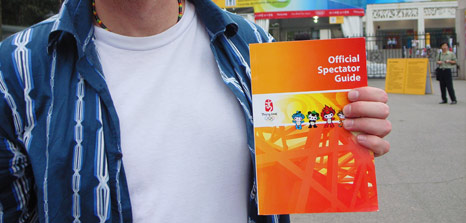 above: the “Official Spectators’ Guide”
above: the “Official Spectators’ Guide”
Thinking of protocol in terms of means, ways of doing… de Certeau’s perruque [1] implies a way of using time within the standards of protocol. What loopholes do we find as individuals, within the “Official Spectators’ Guide”?
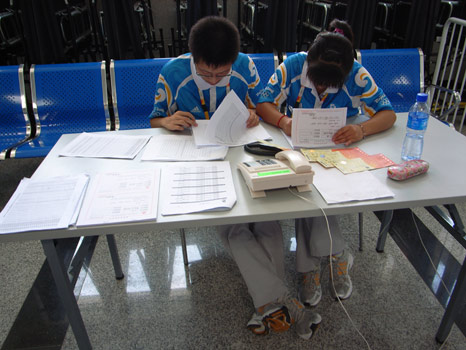 above: Volunteers make arrangements for people who need to change their seats at Olympic events.
above: Volunteers make arrangements for people who need to change their seats at Olympic events.
Where do we abide by a protocol, but where do we always end up finding our own ways of getting there, of doing this or that? As we said before, this is by no means a way to pursue subversion—-we laugh in ignorance at the same time as we act. Living in beijing as 老百姓 laobaixing, as everyday citizens, what modes of protocol do we embody, and where do we meander without noticing?
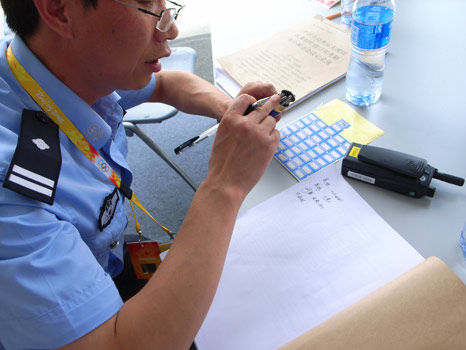 above: Portable cutlery and chopsticks are not allowed on the Olympic green. You can check them in, however, with a simple sticker purchased from any local stationery store and an identifying signing of whatever you want.
above: Portable cutlery and chopsticks are not allowed on the Olympic green. You can check them in, however, with a simple sticker purchased from any local stationery store and an identifying signing of whatever you want.
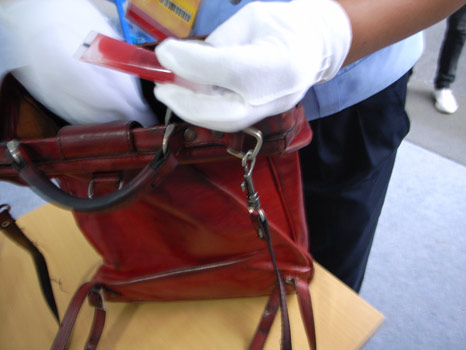 above: Lip gloss is allowed, so long as you put it on before you enter the stadium.
above: Lip gloss is allowed, so long as you put it on before you enter the stadium.
The trace has a very distinct path, a protocol of following someone else’s footsteps or keeping to the line that has been set before… But it is only a slip of the hand, a slight nudging off the solid foundation of following, that sets us into a realm of possibility. Deligny does not neglect his own presence as tracer within the mapping of the traced. Nor can we deny responsibility as creators or thinkers upon those that we engage with, no matter what exchange may be made, or not. Is it a nothing to take notice? Is possibility too open a format? No. Because the protocol is always there; there are hundreds of routine paths and familiar faces that pass here everyday.
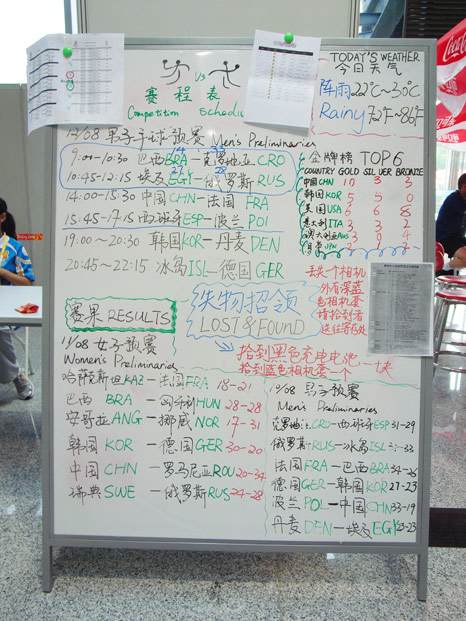
———————
[1] “…la perruque is the worker’s own work disguised as work for his employer…” (Michel de Certeau, The Practice of Everyday Life)

 时间 posted on: 22 August 2008 |
时间 posted on: 22 August 2008 |  发布者 author:
发布者 author: 
 分类 filed under:
分类 filed under:
August 23rd, 2008 - 01:54
finding gaps and loopholes in olympic protocol after protocol has already found its own gaps and loopholes:
http://strydehax.blogspot.com/2008/08/hack-olympics.html
August 24th, 2008 - 01:29
i was both fascinated and highly upset after reading that blog and the thousands of inane comments left there… i would say in the case of He Kexin, if indeed she underage, it would be China that has managed again to make an agency for itself, albeit to an unfair end. Using google hacks to look for something that you’ve set out to discover seems by no means a trace; there is a very very strong objective at hand, as several commenters noted, whereby the possibilities of there being thousands of young girls named He Kexin, and the fact that one very specific year of choice was queried, that makes that gap in the “system” more like simply trying to look yourself in the mirror to make sure you’re still there… you’re right though that these enlightening wastes of everyone’s time are made possible by gaps and loopholes in protocol. but there is a huge difference between trying to build an open platform and coming into the game with your own editorial and unrecognised biases…
August 24th, 2008 - 23:32
At least one of the commenters points out the same things as you with regards to biases. And I don’t disagree with you at all on that point, but let’s leave it aside for a moment.
What I personally find more interesting — selection biases taken into account — is the play back and forth between the cleansing of the archive by the powers-that-be (not to slip into any of the xenophobia spewed in the comments section) and the temporality of the traces in the cache that have been captured and replicated by many in opposition. I see this as sort of an intersectional moment between the “remanence” or forensic materiality of Matthew Kirschenbaum’s Mechanisms: New Media and the Forensic Imagination and Hardt and Negri’s Multitude: War and Democracy in the Age of Empire.
If, as McLuhan suggested, truth is trust in the electric age, then who can we trust? We have been taught throughout modernity to trust in the powerful institutions of State, school, factory, family, etc. But when the factory morphs into the media-information complex, which is so tightly entwined with the State, this trust is stretched to the point of total hegemony or a perceived impotence to resist as an individual. However, when the multitude swarms to create a critical mass of trust in its own right by taking the forensic traces (different than the traces that we are understanding from Deligny, I think) and replicating them across the network, at least the perception of a fixed truth is shattered for even the most naive. And the questioning begins on a larger scale.
Now, whether this sort of intersectional moment extends beyond an attempt to expose the “bad Chinese” to all sorts of trust issues happening across the world in areas less sexy than the Olympics remains to be seen. But for me, this was extremely promising, although with the caveat that counter-research requires an ethic so it doesn’t simply devolve into witch burning. A flash mob is called a mob for a reason.
March 17th, 2009 - 09:43
overheard by no-one today upon exiting the toronto public library:
“sir, i need to look in your bag please.”
(holds the bag out)
“can you open it please?”
“no, you can go ahead and do that (i’m not abetting your surveillance, he thinks).”
“actually, i can’t. it’s considered private property.”
“oh, you mean i need to volunteer to have my bag searched?”
“uh, you can go ahead on through…”
—
protocol, style?
December 3rd, 2009 - 04:13
“I’m interested in topological systems. In San Francisco in winter 2002, I met Jaron Lanier, the inventor of virtual reality, who’s now working on analogic systems. The condition of exchanging information between two computers depends on a protocol of dialogue, and he’s working to establish a way for computers to talk to each other without protocol, based rather on recognition. That’s a beautiful idea. I’m less interested in dramatic, linear processes where there’s a planned protocol. I’m more interested in open scenarios. Douglas Coupland told Disney that the problem with their films is that they’re too efficient, too seamless. I feel like recently every film or narrative structure is becoming too efficient. There’s no time to be distracted, you know what I mean? There’s no time to find your own time in the narrative. Rather than become a part of the film, you are held at a distance from it. It then becomes only an icon. It dominates. There is no possible dialogue between it and you.” — Pierre Huyghe, in interview with Doug Aitken